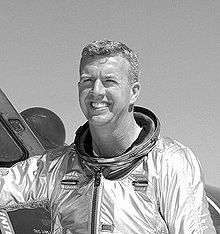X-15 Flight 90
| Mission type | Test flight |
|---|---|
| Operator | US Air Force/NASA |
| Mission duration | 11 minutes, 24 seconds |
| Distance travelled | 534 kilometers (332 mi) |
| Apogee | 106.01 kilometers (65.87 mi) |
| Spacecraft properties | |
| Spacecraft | X-15 |
| Manufacturer | North American |
| Launch mass | 15,195 kilograms (33,499 lb) |
| Landing mass | 6,260 kilograms (13,800 lb) |
| Dry mass | 6,577 kilograms (14,500 lb) |
| Crew | |
| Crew size | 1 |
| Members | Joseph A. Walker |
| Start of mission | |
| Launch date | July 19, 1963, 18:20:05 UTC |
| Launch site |
Balls 8, Edwards Dropped over Smith Ranch Dry Lake 39°20′N 117°29′W / 39.333°N 117.483°W |
| End of mission | |
| Landing date | July 19, 1963, 18:31:29.1 UTC |
| Landing site | Rogers Dry Lake, Edwards |
 X-15 Flight 90 pilot, Joe Walker |
|
Flight 90 of the North American X-15 was a test flight conducted by NASA and the US Air Force in 1963. It was the first of two X-15 missions that reached space, along with Flight 91 the next month. The X-15 was flown by Joseph A. Walker, who flew both X-15 spaceflights.
Maximum Speed - 5,971 km/h. Maximum Altitude - 106,010 m. 80 cm diameter balloon towed on 30 m line to measure air density. First X-15 flight over 100 km (a height known as the Kármán line). This made Walker the first US civilian in space. This was also the first spaceflight of a spaceplane in aviation history. First flight launched over Smith Dry Lake, NV. Experiments: Towed balloon, horizon scanner, photometer, infrared and ultraviolet. Balloon instrumentation failed.
The mission was flown by X-15 #3, serial 56-6672 on its 21st flight.
Launched by: NB-52B #008, Pilots Fulton & Bement. Takeoff: 17:19. UTC Landing: 19:04 UTC.
Chase pilots: Crews, Dana, Rogers, Daniel and Wood.
The X-15 engine burned about 85 seconds. Near the end of the burn, acceleration built up to about 4g (39 m/s²). Weightlessness lasted for 3 to 5 minutes. Re-entry heating warmed the exterior of the X-15 to 650 °C in places. During pull up after re-entry, the acceleration built up to 5g (49 m/s²) for 20 seconds. The entire flight lasted about 12 minutes from launch to landing.
...
Wikipedia
